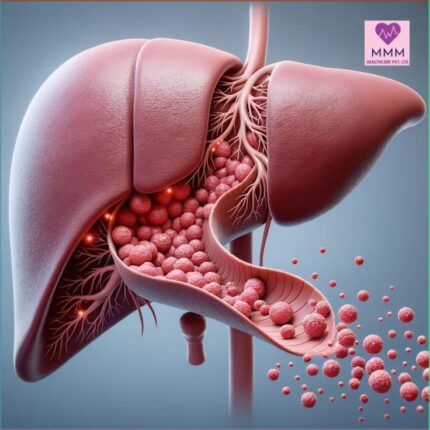The HBsAg test stands for the Hepatitis B Surface Antigen Test, which is commonly performed to diagnose hepatitis B, a liver infection caused by the hepatitis B virus (HBV). Globally, hepatitis B affects a significant portion of the population, with 1 in 3 individuals affected and 300 million people currently living with chronic infection. Due to the high number of deaths associated with hepatitis B, prompt detection of the infection is crucial.
The HBsAg ECLIA (electrochemiluminescence immunoassay analyzer) test screens for the presence of a protein (Hepatitis B surface antigen) related to HBV in your blood sample, allowing for the early diagnosis of this life-threatening infection. The test is particularly useful to detect whether you have an acute (recent) or chronic (long-standing) infection.
HBV, one of the five hepatitis viruses (A, B, C, D, and E), spreads through blood, vaginal secretions, and seminal fluid. Symptoms of hepatitis B can take several months to develop after infection. In most cases, the virus may clear up from the body within six months. However, a small percentage of adults and a higher percentage of children, especially newborns, may develop chronic infections, which can result in liver damage, fibrosis (formation of scar tissue in the liver), cirrhosis (severe scarring of the liver that impairs its function), or liver cancer.
In Bangalore, you can conveniently undergo the HBsAg test at home with Orange Health Labs, ensuring timely and accurate results from the comfort of your home. Early detection through the HBsAg test is essential for initiating treatment and preventing the spread of hepatitis B.
The test checks for only one parameter – hepatitis B surface antigen. Antigens are substances that are recognised by the body as harmful, for example, microorganisms like bacteria and fungi. When the body encounters antigens, it triggers an immune response, producing antibodies to neutralise or eliminate the harmful substances. The HBsAg test checks for hepatitis B surface antigens (found on the surface of HBV) in the bloodstream.
HBsAg is the earliest serologic marker to appear in an acute hepatitis B infection. It can be detected in as early as one week and up to nine weeks after exposure to HBV, with the average being around one-month post-exposure. Early detection via the HBsAg blood test is crucial for prompt treatment and disease management.
Proper preparation for the HBsAg hepatitis test ensures accurate results and a smooth testing process.
No special preparation is needed for the HBsAg ECLIA test. You can eat and drink normally before the test unless instructed otherwise by your healthcare provider.
The HBsAg blood test can be done at any time. However, you should get tested immediately if you have symptoms of hepatitis B or if you believe you have been exposed to the virus.
The HBsAg blood test is recommended for individuals with symptoms of hepatitis B, such as extreme fatigue, jaundice, or abdominal pain. It is also advised for those with risk factors like sharing needles, having sexual contact with an infected person, working in healthcare settings with exposure to blood, or being born to a mother with the virus. Additionally, individuals already diagnosed with hepatitis B may need this test to monitor the infection’s progression and response to treatment.
Inform your treating doctor about any medications, supplements, or herbal remedies you are taking, as some substances might influence the test results. Also, discuss any recent vaccinations or illnesses, as these might affect the test outcomes.
The HBsAg ECLIA test is essential if your healthcare provider suspects you have a liver infection caused by HBV. It is particularly needed if you exhibit symptoms of hepatitis B, which often develop gradually and might not appear until the infection becomes severe or chronic. Many individuals either show no symptoms or experience mild flu-like symptoms.
Common symptoms include:
The test is also crucial if an individual has risk factors for hepatitis B infection, such as:
Additionally, if you have already been diagnosed with hepatitis B, this test may be repeated to monitor the progress of your infection and treatment response






Reviews
There are no reviews yet.